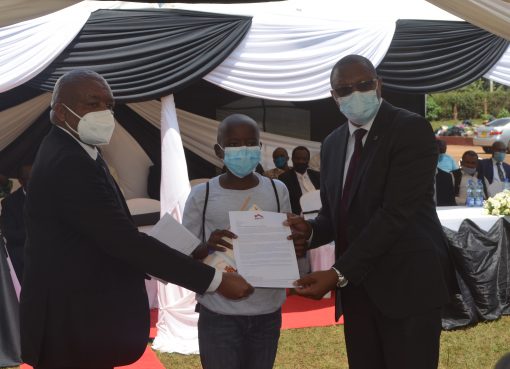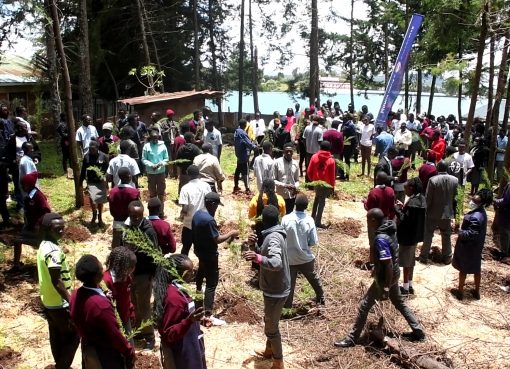An estimated 726,000 people globally commit suicide every year, according to World Health Organization official statistics.
Many more people make suicide attempts but every suicide is a tragedy that affects families, communities and even the whole world at large, leaving long-lasting effects on those left behind.
Last year alone suicide was cited as the third leading cause of death among people aged between 15 and 19 years across the world.
The WHO estimates also show three quarters of global suicide cases in 2021 occurred among middle- and low-income countries.
In Nyeri, over the last few years, an alarming increase of suicide cases has been reported with men bearing the brunt of the chilling trend.
Notably, early last month Nyeri County Commissioner Ronald Mwiwawi called for concerted efforts from all stakeholders to help reverse the soaring number of suicide cases being reported in the county.
Mwiwawi warned that unless drastic steps were taken to address the root cause of the runaway suicide rates in the county, the problem might soon metamorphose into a social catastrophe.
He also disclosed that the majority of those who were taking their lives were mostly men who are the most critical pillar in the stability of any society.
“For the three months I have been here suicide cases have been very high. Suicide has become a thorny issue until I asked those people with mental health issues to walk into my office and have a dialogue and understand why we are taking our lives. Let us talk to one another so that we can reduce the cases of suicide,” he advised.
He made the remarks while launching the Social Health Authority registration exercise at the Nyeri Town Health Center.
During last year’s 61st Jamhuri Day Celebrations at the Nyeri Kamukunji grounds, Mwiwawi directed all deputy commissioners, chiefs and their assistants to organize frequent public barazas in order to address suicide cases in the county.
He said he was horrified at the growing number of people who were taking their lives in the county describing the challenge as alarming.
The administrator said it was unacceptable for people to continue taking their lives at such an alarming rate while those in authority do nothing about the issue.
Bishop Dr. Erastus Njoroge, Chair, Kenya National Congress of Pentecostal Churches (KNCPC) told KNA he recently came face to face with a 50-year-old man who wanted to take his life.
He rushed to the man’s house and fortunately managed to calm him down and also confiscated the rope and poison he intended to use to end his life.
“Many people are desperate and have no one to turn to for help. People are going through so many challenges and have no one to talk to. I have dealt with so many attempted suicide cases with the most recent one being of a man in his 50s. I told him I visited because I wanted him to live. Taken aback at my words he asked me whether there were still people who still retained an iota of concern and love for others. After answering in the affirmative, he broke down before me and promised never to take that road again,” disclosed Dr Njoroge.
Dr Njoroge says in addition to advocacy, much counselling is needed to help address the challenge of suicide cases in the society.
He similarly explains that spiritual nourishment plays an integral role in managing mental health disorders.
“The young people need a lot of counselling and as spiritual leaders we are available to offer help. If it were possible for every youth to be connected to a church it would be easy to conduct programmes and events tailored to their needs. Such programmes provide opportunities for mentorship to the youth including on how to deal with relationships,” advises the cleric.
Njoki Mariano, a mother of six living in the slums of Majengo in Nyeri County, recounted to KNA how depression claimed the life of her grandson six years ago, who was only fifteen years old.
Mariano cites the experience as one of the most heart-breaking experiences in her entire life, losing a close relative at such a tender age.
“No tragedy bewilders a family more than suicide. The demise of my grandchild came to me as an absolute shock. There was no prior expectation as everyone had woken up and embarked on the normal routines. It was only later in the day I received a call from my brother informing me that my grandson had been found hanging on a branch of a tree,” narrates Mariano.
Though her initial reaction was one of denial, the reality got the worst of her when she finally saw the lifeless body of her lovely grandson lying on the cold slabs of the morgue, as another statistic of the cruel hand of suicide.
Jane Wangechi a resident of Skuta estate, says she lost a cousin aged 38 years also through suicide.
Wangechi says they only came to learn her cousin had been struggling with financial challenges for some time through a suicide note he left behind.
Following the unfortunate incident, Wangechi now urges people not to shy away from disclosing their struggles with those they feel comfortable with instead of bottling up their struggles.
“I lost my cousin after he hanged himself in his bathroom due to financial struggles. It was so painful because we were friends and I never knew he was struggling with suicidal thoughts. We all face challenges in life but it is good to speak up when it gets really tough rather than sliding down the road to perdition,” she explains.
Dr Fabio Ogachi, a mental health specialist and psychology lecturer at Kenyatta University, says the reason suicide cases seem high among men compared to women is because the latter readily open up about their challenges.
On the other hand, the scholar says society tends to equate the male gender with masculinity and machismo, a false label that portrays men as invincible.
People only realize the frailty of man after someone decides to take away his life rather than open up to society and be stigmatized.
“The rate of suicide is higher among men than women. There are so many cases that go unreported because of the stigma associated with suicide. It is not acceptable for men to be vulnerable so you find out that they don’t have an outlet for expressing their psychological pain. Suicide then becomes a viable option because they feel misunderstood.
If you look at women, they tend to express themselves when faced with challenges and emotionally they are able to have an outlet. If a man does the same, he is regarded as a weakling,” states the university don.
Dr Fabio nevertheless says that there are some notable red flags that can help pick out someone undergoing mental health challenges, a sure precursor in most suicide cases.
In such instances, it is always prudent for those around such individuals to take prompt remedial steps to ensure the victim does not slide beyond help.
Remedial measures include but are not limited to counselling therapies, medical intervention and also practical magnanimity whichever is applicable in a specific case.
“There is a typical change in behaviour as a result of depression where an individual starts to isolate themselves from others. Some tend to withdraw from the social associations like work, family or hobbies they loved before. An individual can indulge in drugs and substance use excessively. Another sign can be through statements or comments a person makes wishing death on themselves,” he continues.
Dr Fabio encourages men to seek both community and professional help whenever they feel an issue is beyond their personal capacity.
He underscores the significance of a social support system as a critical cog in the fight against suicide cases in the country.
“I encourage men to seek professional help either by visiting a counsellor or psychologist, as they offer space where they can be heard and won’t be judged. Some issues need professional help while others can be resolved at the community level. I also encourage men to create their own forums as it’s easy for men to talk about their challenges with other men compared to the general public,” he advises.
“It is important for everybody to have social support because lack of it leads to suicidal thoughts. People who are isolated and live in an environment that they feel judged and can’t freely express themselves tend to commit suicide compared to people who have social support system,” he further informs.
By Samuel Maina and John Bacha





